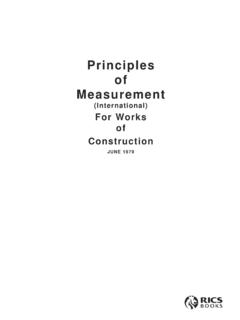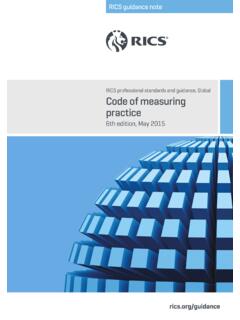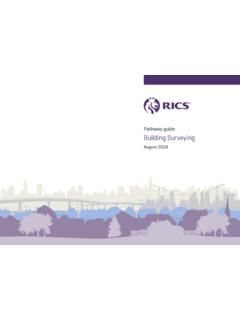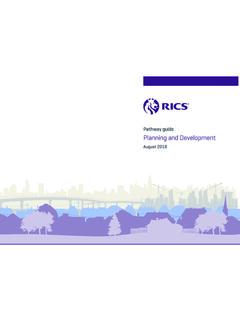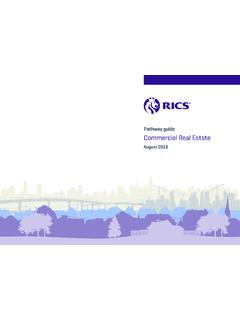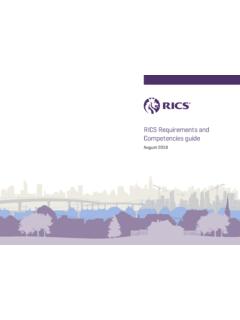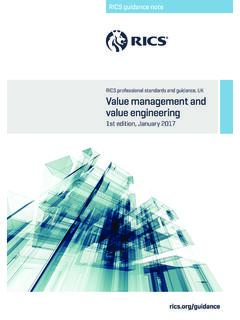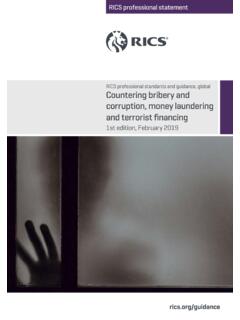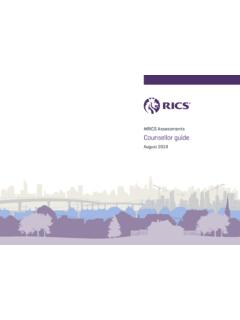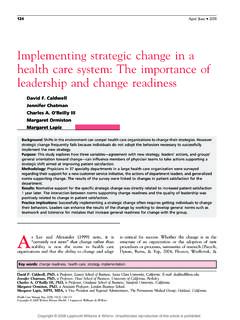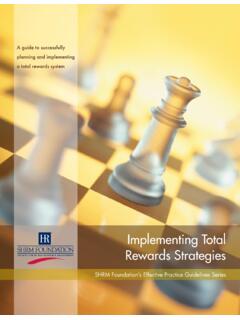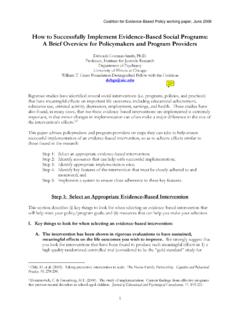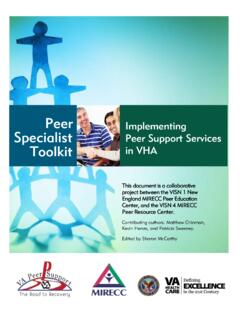Transcription of Implementing the UN Sustainable Development Goals
1 Implementing the UN Sustainable Development Goals the UN Sustainable Development GoalsThe UN Sustainable Development Goals (SDGs) provide a model for addressing the most important economic, social and environmental challenges of our time. Given the magnitude of the task ahead, governments cannot achieve these Goals on their own which is why the United Nations is calling on organisations around the world to align their operations with these Goals . RICS, as a participant of the UN Global Compact the world s largest corporate sustainability initiative, is committed to supporting delivery of the SDGs in the land, construction, real estate and infrastructure sectors. To advance our sector s important role, RICS joined forces with the UN Global Compact to drive awareness and action in support of achieving the SDGs by collaboration with sectoral stakeholders and members, supported by numerous UN agencies, we have translated the Global Compact s ten principles in the areas of human rights, labour, the environment and anti-corruption into our sector s language and into direct actions our professionals can take to implement the SDGs.
2 The resulting resource Advancing Responsible Business in Land, Construction and Real Estate Use and Investment Making the Sustainable Development Goals a Reality is freely available on the RICS UN Sustainable Development Goals a common language for land, construction and real estate 2018 Advancing Responsible Business in Land, Construction and Real Estate Use and Investment Making the Sustainable Development Goals a Reality SDGs are important With its economic impact and its cross-sectoral reach, our profession can be a powerful driver for making the SDGs a reality and for action on climate change. The figures below speak for themselves. The built environment represents up to 70% of global wealth, generating 10% of total GDP and providing 7% of global employment. The built environment represents up to70%of global wealthwhich generates10%of total GDPand provides7%of the worlds jobsBut along the built environment life cycle our sector clearly also causes substantial environmental and social impact through land Development and management of built professionals, whether they work as a sole practitioner or a firm operating globally, work within every stage of the property life cycle.
3 Through your daily work with clients, and your own organisational strategies and policies, you can positively influence levels of resource use, emissions, waste generation and take an active stand on anti-corruption and labour , your clients are engaging with the Goals and may ask you questions on how to align their real estate assets with the SDGs. This is especially the case with large multi-national corporations and the investment contribution to greenhouse gas emissions and climate changeIntense resource use and waste generationHuman rights infractions and corrupt practices++ Implementing the UN Sustainable Development GoalsThe benefits of actively engaging with the SDGs Implementing the SDGs demonstrates a commitment to acting in the public interest. Surveying professionals and firms who align their business activities with the SDGs pursue transparency, meaningful engagement with stakeholders and assume responsibility for potentially adverse impacts of their operations and take mitigating practical terms, applying a Sustainable business strategy through the adoption of the SDGs affords many benefits to your firm and your clients.
4 As a leader on SDG issues, your clients will trust and value your approach to commissioning, designing, constructing and using their real estate assets. By complying with policies and regulation and by adopting best practice you are mitigating client risk by securing consistent and long-term access to high quality suppliers. A more Sustainable business strategy leads to healthier, happier, more engaged and productive people. Considerable cost savings can be realised through Sustainable usage of energy, water, waste efficiency and fewer raw materials Increase brand value and reputationReduce operational risks (licence to operate)Maximise human capital through improved living/working conditions, increased well-beingEnable bottom line cost savings by optimising operational resource efficiency+ does delivering on Climate Action play a central role in achieving most of the other SDGs?Climate change is a complex, multi-dimensional phenomenon. Therefore, climate action should and cannot be seen in isolation.
5 It is the core goal, central to achieving a sizeable number of the other Goals , such as Goals 1, 2, 10, 14 and 15. Other SDGs, such as Goals 7, 9, 11 and 12 are key for gaining traction on climate action while at the same time being supported by climate the UN Sustainable Development GoalsWhat RICS is doing on climate actionClimate action is at the heart of what we do from issuing professional guidance, commissioning research, developing training, capacity building programmes and tools that address critical sectoral challenges, such as lack of data, driving investment to climate-friendly solutions to strategic partnerships. 1 Guidance and standards2 Research and economic analysis9 Partnerships3 Capacity building8 Thought leadership7 Sustainablefinance6 Better data5 The business case4 ToolsRICS Climate Change Guidance and standardsWe are supporting our professionals with dedicated guidance on climate action from assessing embodied carbon to resource management to valuation.
6 Examples of our professional guidance in relation to climate action:Sustainability and Commercial Property ValuationWhole Life Carbon Assessment for the Built EnvironmentEnvironmental risks and global real estateResource Management: Improving Efficiency and Reducing WasteThe Valuation of Assets in the Commercial Renewable Energy Sector Implementing the UN Sustainable Development Goals2. ResearchThrough the RICS Research Trust and collaborations with academic institutions, we have been commissioning dedicated research to establish the link between sustainability in real estate and value and associated value drivers, economic, social, compliance, reputational etc. Examples of our leading research on climate action:Energy efficiency and residential values: a changing European landscapeBenefits of green building: a literature reviewChanging priorities in investor decision-making: the sustainability agendaValue of natural capital the need for chartered Capacity building Sustainability is a mandatory competency for RICS professionals.
7 Taking action on climate change depends on knowledge and capacity to deliver. We are ensuring skills Development for built environment professionals and taking proactive steps to support education, lifelong learning and training on climate action. The RICS Online Academy offers a wide-range of training courses either directly focused on climate action or associated SDGs. Examples of our capacity building offering for climate action: Sustainability competency masterclass Focusing on key practical elements building confidence and knowledge necessary to demonstrate competence within the RICS assessment. Sustainability communicating value How Sustainable products can deliver cost efficiencies and improve value, and how collaboration is key to successfully Implementing Sustainable solutions. Renovalue: Integrating sustainability into valuation practice Identifying and applying energy efficiency and renewable energy factors into a valuation. Sustainable products and the circular economy How to select and use Sustainable products, and look at the potential for a circular built environment.
8 Material use in the built environment Looking into the scarcity of commonly used materials and innovative methods to reduce and reclaim what the industry consumes. Sustainability online learning bundle Aimed at construction professionals, creating awareness of the various ways in which sustainability can impact on Development and construction. Measuring adaptability On measuring climate adaptability of buildings and the tools of the future. Well-being and adaptive design Exploring the future of green buildings and understanding how this delivers pleasant spaces that encourage the UN Sustainable Development Goals4. Tools Guidance and skills are key prerequisites for climate action in the sector. In addition, we have created dedicated tools and new processes that will boost sectoral efforts and targets around climate action. Example of RICS-led tools:SKA rating is an environmental assessment method, benchmark and standard for non-domestic fit-outs, led and owned by RICS.
9 It comprises over one hundred good practice measures covering energy and CO2 emissions, waste, water, materials, pollution, well-being and transport. It helps organisations to make informed decisions about fit-out projects in the context of the growing importance of sustainability on the corporate agenda. The rating is designed to be of particular use for occupiers but has benefits for other property stakeholders, including landlords, developers, consultants, fit-out contractors and members of the supply on the involvement in two previous EU projects related to valuation (RenoValue and REVALUE), we have played a crucial role as valuation work package leader of the Energy Efficiency Action Plan (EeMAP) project. The EeMAP project is an initiative, through which preferential financing conditions link to the mortgage. EeMAP aims to incentivise home owners to improve the energy efficiency of their homes or acquire an already energy efficient property. RICS has developed a dedicated Energy Efficiency Valuation checklist, supporting guidance and webinar training modules.
10 45 banks have committed to participating in the pilot scheme. The project has also included the publication of the following two reports:5. Strengthening the business case for investment in climate action Developing, strengthening and communicating the link between sustainability and the value of buildings has an important part to play in achieving the Paris Climate Agreement and in transforming of our work on strengthening the business case:Creating an energy efficient mortgage for EuropeEnergy efficiency lending and valuation due diligenceImplementing the UN Sustainable Development Goals6. Better data The key ingredient for being able to articulate the business case for action on climate change, is the availability and access to robust local building construction and performance of our work on data: Driving the Development of Building Passports Building on the findings from the RICS Insights paper Global Trends in Data Capture and Management in Real Estate and Construction , we have initiated the Building Passport project to address the current lack of data transparency in the sector.
